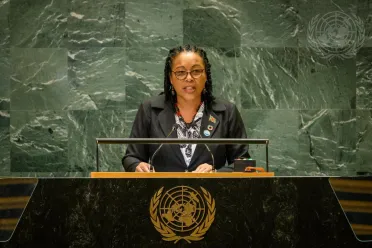Statement
Statement summary
SYLVANIE BURTON, President of Dominica, noting that she addresses the Assembly as her country’s first female and first Indigenous President, joined her voice “with those who believe that no one” should be left behind in the “relentless pursuit of advancement”. For Dominica, as for many small island developing States, climate change is not a distant or abstract issue. “It is a daily reality,” she stressed, recalling the tropical storm that wiped out 96 per cent of Dominica’s GDP in 2015 and the 2017 hurricane that destroyed over 225 per cent of her country’s GDP “in a matter of hours”. And, in 2024, Dominica watched in agony as Hurricane Beryl swept across Saint Vincent and the Grenadines, Grenada, Barbados and Jamaica. “These tragic occurrences embolden us to state firmly that the time for rhetoric has long passed,” she said, calling for urgent, bold and decisive action to limit global warming to 1.5°C — “as science clearly dictates”.
This requires, she went on to emphasize, drastically reduced emissions, honoured financial commitments and resilient infrastructure in regions particularly vulnerable to the effects of climate change. As Caribbean States direct their gaze east towards the storms emerging from the Atlantic, there is no denial that climate change is happening. “We see,” she underscored, and “we feel its disastrous impacts on a daily basis”. And, while Caribbean States have prioritized the development of national climate adaptation strategies and invested in resilient infrastructure and agriculture, community education and renewable energy, these interventions will remain ineffective, she stressed, “if our friends and partners in the industrialized world do not honour their commitments to reduce global warming and provide the funding that is required”. Adding that high-emitting countries must recognize and accept responsibility for their destructive practices and “do the noble thing”, she stated: “We will not relent until they do.”
Turning to Haiti, she said that its present challenges are, in part, related to the “glorious contribution Haiti made to the quest for justice and freedom in our region and the world”. It is therefore much more than a Caribbean crisis, and she underscored: “The heroic sacrifices of Haitian blood and treasure that opened the door to the liberation of so many of our countries — making it possible for us to be members of this august body — deserve no less than the abundant peace and prosperity of the wonderful Haitian people.” Spotlighting Kenya’s strategic support to bring the security situation under “some measure of control”, she pointed out that such support “is as natural as natural gets” due to the “ancestral and historical connections that we share, as well as the imposition that history placed on us to struggle for our liberation”. She also thanked the United States and Canada for supporting the effort to stabilize Haiti, as well as other States that have supported the restoration of an environment conducive to peace and development.
Nevertheless, she urged that the long-running economic embargo against the people of Cuba be set aside, as “it hurts the people of Cuba as well as the image of its sponsors” and belongs “to a bygone era”. Such measures should cease to exist, she stressed: “They fall, in our view, within the grand narrative of yet another Caribbean people’s struggle for liberation.” She also condemned the United States’ imposition of sanctions on Venezuela, emphasizing that the resulting hardship forced upon that country’s people “needs an immediate and complete end”. Concluding, she recalled that her ancestors — the Kalinago people — lived in harmony with nature, drawing on it for food and general well-being, and lived a communal life marked by social cohesion. “My delegation recommends this way of life, of our Kalinago people, to this body,” she said.
Moving north to Dominica, nestled in the windward islands of the Caribbean Sea, President Sylvanie Burton also highlighted the “daily reality” of climate change that her country faces.
“We have said it time and time again. We see it so vividly, year after year, that our communities are on the frontlines, facing intensified hurricanes, devastating floods, and prolonged droughts,” she said.
She recalled the devastation wreaked by Tropical Storm Erika in 2015, which wiped out 96 per cent of Dominica’s gross domestic product (GDP), to be followed in 2017 by Hurricane Maria that destroyed over 225 per cent of the GDP, “in a matter of hours.”
“Mere hours… That is why, this year, we watched in agony as Hurricane Beryl swept through the island-States of St. Vincent and the Grenadines, Grenada, Barbados, and Jamaica,” she noted.
Stressing that such tragedies reiterate that the “time for rhetoric has long passed”.
“Business as usual, simply will not suffice. We need urgent, bold, and decisive action to limit global warming to 1.5 degrees Celsius, as science clearly dictates,” she said, calling for a drastic reduction in emissions, honoring financial commitments and building resilience, especially in regions most at risk.
Full statement
Read the full statement, in PDF format.
Photo

Previous sessions
Access the statements from previous sessions.
